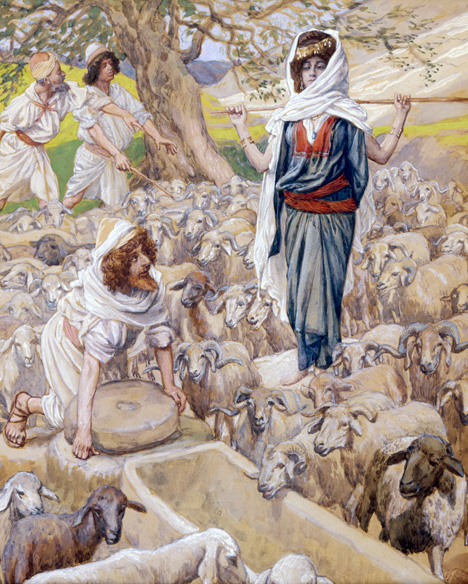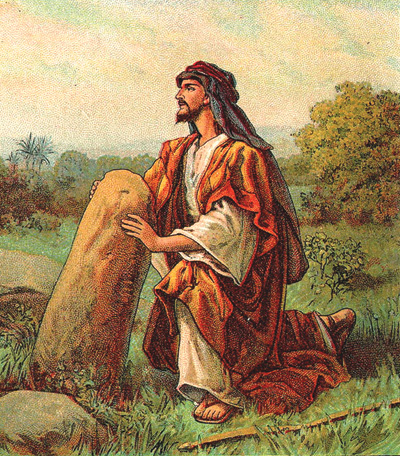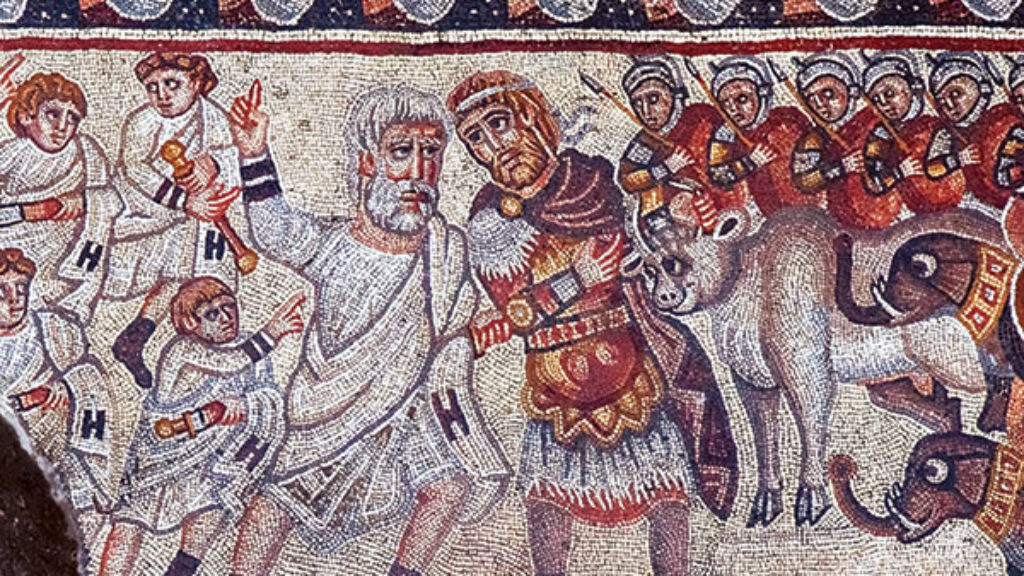Jake in the Box
Don’t be fooled by the number of pages in Yair Zakovitch’s slim volume. Zakovitch begins with the struggle of Jacob and Esau in the womb and follows the biblical account of Jacob’s fascinating life until, as his life ebbs, he speaks to all of his sons. His book packs a punch like a jack-in-the-box.
In Jacob we get more than a close reading of the biblical text. Zakovitch shows us Jacob in midrash, the Apocrypha, and the Pseudepigrapha; he brings in the Septuagint, the famous Greek translation of the Bible, as well as the Samaritan and the Syriac Bibles, Qumran texts, and parallels even further afield. All of these shed light on the biblical narrative, especially when it is elusive, ambiguous, or silent, demonstrating that there were differing strands, nuances, and even details within the same basic story.

A fine example of Zakovitch’s method is his analysis of one famous verse in Genesis. Rachel, Jacob’s favorite wife, has died giving birth to Benjamin. After Jacob names the boy and buries his wife, his son Reuben, son of Leah, “went and lay with Bilhah, his father’s concubine” (Gen. 35:22). Zakovitch suggests that Reuben intends to defile her so that Jacob will stop sleeping with her, and Leah’s honor will not be offended a second time. He quotes a striking midrash from Genesis Rabba:
When Rachel died, our father Jacob took Bilhah’s bed and placed it near his bed. [Reuben] said: Is it not enough that my mother was jealous of her sister during her lifetime, but even after her death?
More surprisingly, he also reminds us of a parallel in The Iliad. Phoenix, obeying his mother’s wishes, takes his father Amyntor’s concubine, “so that the old man might be hateful in her eyes.”
There is more. In the very same verse describing Reuben’s act, we see the words: “Israel (i.e., Jacob) found out.” At this point in the Masoretic text, Zakovitch notes, come a few empty spaces. But there is even more. Under the word “Israel” is an etnakhta, a sign showing the midpoint of a verse; let’s call it a semicolon. Then, after a few spaces comes the letter peh, a Masoretic indicator that—in mid-verse!—a new parsha (chapter or segment) is beginning. The verse continues with an apparent non sequitur: “Now the sons of Jacob were twelve in number.” Zakovitch is rightly puzzled by this strange pattern. Is it evidence, he asks, that Jacob’s response has been erased? He then looks to the Septuagint, where the verse continues, “and it was evil to him”; while in the apocryphal Book of Jubilees (ca. 120 B.C.E.) we read: “and Jacob was very angry with Reuben.” In quoting these extra ancient readings, the author makes the empty spaces in the Torah text speak.
Discovering parallels within the biblical text is another of Zakovitch’s strengths. When Jacob has to labor another seven years for Rachel (in addition to the seven he has just completed), the years passed as if they were “a few days because of his love for her” (Gen. 29:20). With a keen eye, Zakovitch reminds us that earlier, when Rebecca had sent her son away to Laban to avoid Esau’s wrath, it was also for “a few days” (Gen. 27:44). And, of course, in both instances the days stretch into years.
Zakovitch sees similarity in the parting of Abraham and Lot, each going his own way (Gen. 13:5-12), and the peaceful parting of Jacob and Esau (Gen. 36:6-8); both deeds were done to avoid familial strife. The author also likes the echo of the phrase b’not ha’aretz, literally “the girls of the land,” or, more colloquially, “the local girls.” Rebecca uses these words, fearing that Jacob might marry one of “the local girls” (Gen. 27:46), and later, the text tells of Dinah going out to see “the local girls” (Genesis 34:1), which proves to be her undoing.
The garment trick is another fine parallel spotted by Zakovitch, which he calls a “measure for measure punishment.” Jacob fooled his father by wearing his brother’s clothes to get the blessing (Gen. 27:15-16); later his sons fool him with Joseph’s ripped, bloodstained garment (Gen. 37:32).

When Rebecca was pregnant with twins she went to consult God about the tumult within her, and was given an ambiguous blessing (Gen. 25:23), ve-rav ya’avod tzair. Zakovitch’s translation, “Older younger shall serve,” is ingenious, for it reflects the either-or aspect of the Hebrew. The author’s unique and absolutely correct grammatical rendering can mean that the younger will serve the older; and it can mean precisely the opposite.
Jacob’s enterprising spirit began in the womb when he struggled to exit first, before Esau, in order to secure the rights of the first born, and reached its high point when as a young man he used tactical advantage—a very hungry Esau dying for a meal—to “buy” the rights of the first born. Whether intentionally or not, Zakovitch shows that Jacob was not only the “unexpected patriarch,” but also a sad, morally ambiguous, and finally tragic figure, despite his being blessed by God.
Zakovitch reminds us that Jacob didn’t pack when he ran away from home. At Bethel, he needed a stone for a pillow. That night, God promises him plenty (Gen. 28:14-15), which makes Jacob happy. Jacob, the clever entrepreneur (recall how he managed to enlarge his flock through an ancient form of selective breeding), is the only one of the patriarchs who puts conditions on his acceptance of God. “If God remains with me, if He protects me on this journey that I am making, and gives me bread to eat and clothing to wear, and if I return safe to my father’s house,” (Gen. 28:20) Jacob vows, then the Lord will be his God. Curiously, the bargain-cum-vow is made after God has already promised him much of what he is requesting.
In a phrase the early rabbinic tradition seized upon, the Torah calls Jacob a tent dweller (Gen. 25:27), which they took to mean a quiet scholar. But the biblical Jacob is by no means a tent-dwelling, bookish, weakling shepherd—a man opposite to the strong hunter Esau. A shepherd spends his time outdoors fending off the very beasts that Esau no doubt encountered as a hunter. Shepherds were no tent-dwelling sissies. When Jacob meets Rachel by the well, a huge stone is blocking it, which he removes single-handedly. In that same verse in which Jacob is called a “tent dweller,” he is described as tam, which can mean, “simple,” “pure,” “innocent,” “naïve,” or all of them at once. The juxtaposition between that mild word—in fact, the new JPS translation uses “mild” for tam—and, just a few verses later, Jacob’s fooling Esau out of the birthright is a deliberate bit of biblical irony. The Jacob of the Bible, like some other ancient heroes, seems to have been both strong and devious.
In rabbinic literature, the strong and sturdy, evil hunter Esau is nonetheless contrasted to the good, studious, tent-dweller Jacob. This tradition, which persists to this day, also makes Jacob a scholarly type, immersed in Torah study. Some two thousand years ago the sages re-created Jacob to fit their ideal of a Jew, having him study in the famous yeshiva of Shem and Ever (which, not surprisingly, is not mentioned anywhere in the Torah, for such an institution did not exist then). Alas, for study one needs texts, and for texts one must be literate. Alas, again, there is little reason to believe that Jacob, or his father, Isaac, or his grandfather, Abraham, were literate. Indeed, when Jacob and Laban make a peace pact (Gen. 31:45-49), they do not sign anything; rather, they erect a pile of stones that marks their covenant. (The verb khaf-tav-vet, write, does not appear until Exodus.)

When Jacob stands before Pharaoh near the end of the book of Genesis and says, “few and bad (me’at ve-ra’im) have been the days of my life” (Gen. 47:9), he is not exaggerating. “Awful” might be a better translation. Speaking to Joseph’s royal employer, Jacob states crisply what his unhappy life has been all about. And then Jacob blesses Pharaoh.
Despite all of God’s blessings and all the promises for the future about being a great nation, Jacob’s personal happiness has been almost nil. He stole Esau’s blessing, fled his homeland, and served Laban for twenty years. In mid-life, he lost his beloved wife Rachel in childbirth; he was cuckolded by his own son; his daughter Dinah was raped; and his two sons, Simeon and Levi, disgraced him by murdering the inhabitants of an entire town in revenge. Meanwhile, he mourned the apparent loss of his favorite son Joseph for years. And, perhaps, beneath it all was his guilt at tricking Esau out of his birthright in exchange for a bowl of lentil broth.
Somehow, for the “unexpected patriarch,” the rosy future promised to him and the bleak and tragic present go hand in hand. In fact it is immediately after God promises that “the land I assigned to Abraham and Isaac I assign to you,” that Rachel dies in childbirth (Gen. 35:12-20).
Let’s conclude with Jacob’s “blessing” his sons before he dies. Look carefully at the twenty-seven verses in Chapter 49 that comprise this speech and see if it can realistically be called “Birkat Ya’akov” (Jacob’s Blessing), as we persist in calling it. In fact, Jacob himself doesn’t call it a “blessing.” Rather, he proclaims to his sons, calling each one by name, that he will tell them what will happen to them at “the end of days,” the only time this apocalyptic phrase is uttered in Genesis. He starts by severely castigating Reuben for the Bilhah affair. Then he turns to Simeon and Levi, the murderers of Shechem, to curse them. “Jacob is so enraged at them,” Zakovitch says, “that he avoids addressing them directly and speaks in the third person.” Blessing, indeed! (I would argue that a close reading of Genesis shows indirect address is Jacob’s usual manner of speaking, but it does not spoil Zakovitch’s point.)
With such a beginning, the other nine sons must have wondered what would follow, but it does get a little better. Nonetheless, it is only with Joseph, the eleventh of the twelve sons, that the root for blessing “bet–resh-khaf” appears, and in plenitude—six times. And then, in Genesis 49:28, as if to compensate for the no-blessing, the Bible goes on to blandly declare that Jacob blessed his sons. Five of them are compared to animals: Judah, a lion’s whelp and lion; Issachar, a strong-boned ass; Dan, a serpent and viper; Naphtali, a hind; Benjamin, a devouring wolf. Others Jacob merely describes: Dan will be a judge; Gad, a warrior; Joseph, a fruitful vine.
Jacob shows no hint of affection to his grown sons, but his attitude to Ephraim and Manasseh, Joseph’s sons by his Egyptian wife, is far different. “Bring them to me,” he tells Joseph simply, “and I will bless them.” He then kisses and embraces them in an act that has been repeated for centuries, as Jewish fathers recite these verses in blessing their children on Friday nights. But just as Jacob’s remarks to his twelve sons were no blessing to most of them, so Jacob’s blessing of his two grandsons is no blessing either. Both Ephraim and Manasseh were of the lost tribes. Which father would really want his children to be like Ephraim and Manasseh?
Poor Jacob! With the exception of Judah, neither his blessings nor his curses were efficacious. The descendants of Joseph, Ephraim, and Manasseh disappeared. And Levi, the cursed son, whom Jacob had tried to punish by not allotting him any portion in the land and predicting that he would be “dispersed in Israel,” became the progenitor of Moses, Aaron, and the priestly class: kohanim and leviyim, who are still active and honored in synagogues even today.
Zakovitch’s accomplishment in this challenging and incisive book is to force us to re-read the Jacob stories afresh, to follow up on his observations and suggestions, and to inspire us to make new discoveries of our own. Jacob: Unexpected Patriarch has also been so felicitously translated by Valerie Zakovitch that it reads as though it was composed in English.
Suggested Reading

Daniel Bell (1919-2011)
In memoriam.

God’s Law in Human Hands
A Judean, a Stoic, a Jewish philosopher, a Jesus follower, and a rabbi walk into a seminar room at Yale, and Professor Christine Hayes asks them, “What do you mean when you say divine law?”

Coming of Age in the Sephardi Diaspora
Elizabeth Graver’s new novel shines a light on the Sephardi experience.

Cynthia Ozick’s Art and Ardor
Reading is a blessing and a curse in Ozick’s world, a gateway to heightened emotion and new experience and also a maze of cruel tricks and dead ends. Allegra Goodman reviews her latest novel.
Comments
You must log in to comment Log In